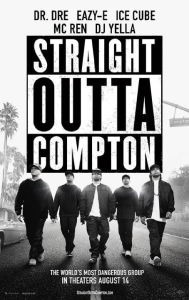
SteveMcCabe.net...
...being the online presence of Steve McCabe himself
On Straight Outta Compton, and a whitewashing
August 31st, 2015NWA were, if Straight Outta Compton is any indication, a three-piece outfit. The film, then, is clearly not the most reliable of witnesses.
Straight Outta Compton tells the story of NWA’s dramatic rise to fame with the release of their first album, from which the film takes its title, in 1988. It focuses — not entirely surprisingly; Ice Cube and Dr. Dre are credited as producers — on Ice Cube, Dr. Dre and Eazy E, largely glossing over MC Ren’s, DJ Yella’s, Arabian Prince’s and The D.O.C.’s contributions to the band. And, given the inevitably hagiographic tone, the story itself is disappointingly lifeless — Eazy E is befriended by record distributor Jerry Heller, Straight Outta Compton is recorded and becomes astonishingly successful, fame ensues and then it all goes pear-shaped.
The story is, of course, well known, so this isn’t so much an exercise in narrating the dramatic ascent of an important band. Instead, it serves, it would seem, to rehabilitate the reputations of its three leads. Ice Cube, played here by his son, O’Shea Jackson Jr, is an innocent schoolboy who’s swept along into something much bigger than him; Dr. Dre is a musical genius behind the production of NWA’s output. Eazy E’s drug dealing is addressed head-on, an easier task given that Eric Lynn Wright died of AIDS in 1995, but Dr. Dre’s well-documented violence against women is entirely avoided.
While failing as a piece of history, revealing as it does little about the genesis of NWA and serving largely to remind us what heroes its members were and what utter shits the likes of Heller and Suge Knight, Dr. Dre’s colloborator in the establishment of Death Row Records, were, Straight Outta Compton isn’t an entirely bad watch. Paul Giamatti is, as ever, superb, portraying the slime and sleaze of a man who clearly had his own interests closest to his heart. Corey Hawkins, of the three leads the most experienced actor, plays Dr. Dre with depth, depicting a conflicted individual who is trying to make sense of his sudden rise. Less successful is F. Gary Gray’s filmmaking — the film is well over two hours long, much longer than it needs to be, and drags more than a film like this really should. Gray shoots his set-piece concert footage excellently, capturing deftly the energy and anger of an NWA performance. But the film’s treatment of the women in NWA’s world is disappointing, at best — for the first half of the film, more lines are delivered by naked women than by clothed ones, and the only women who make any meaningful contribution to the film are a mother and two wives. Perhaps Gray is trying to reflect the misogyny inherent in the musical genre he’s depicting; at any rate, women, with rare exceptions, have two roles in this world — if they’re not hos, then they’re bitches. This is underlined by a screenplay by Jonathan Herman and Andrea Berloff, which would seem to reflect less how black men really speak, and more how middle-class white folk imagine they probably speak.
I had very low expectations of this film when I went in. I’m not a fan of rap music; little of what I saw made me want to try listening to rap further. If you’re a fan of the band and their music, you might find Straight Outta Compton to be worth a look. It’s not a film I’ll want to see again.

Leave a Reply